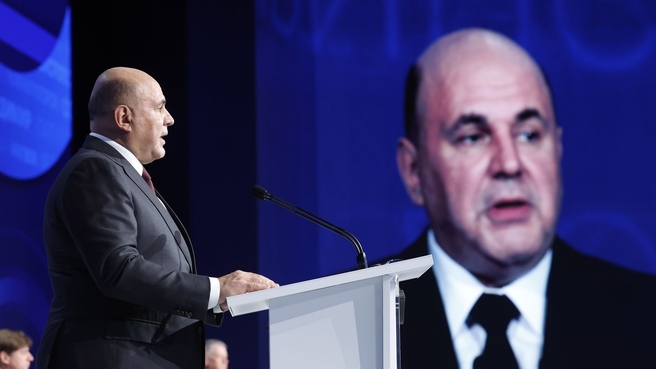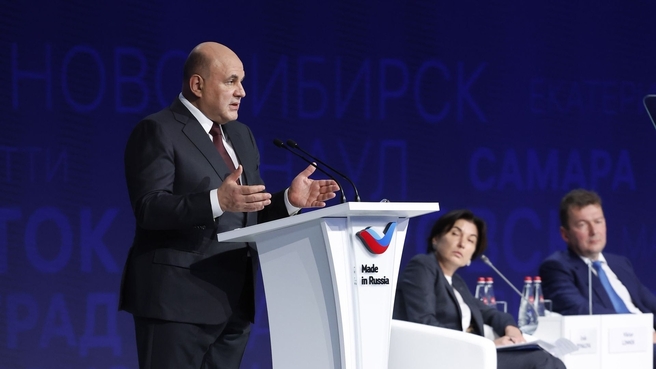The Prime Minister toured the exhibition featuring wares by forum participants and spoke at the plenary session, Pillars of New Architecture of Foreign Economic Activity.
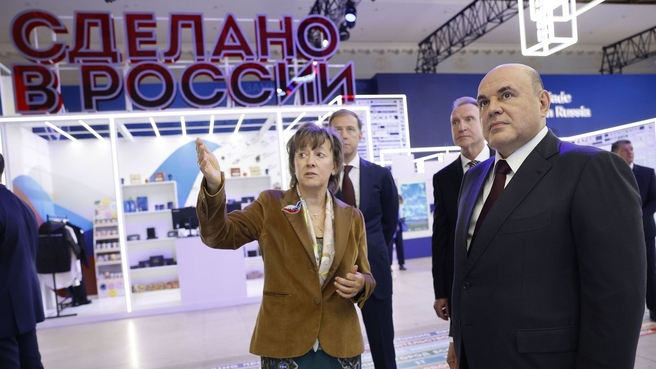
Mikhail Mishustin at the exhibition featuring wares by participants of the Made in Russia 2023 International Export Forum. With Veronika Nikishina, Director General of the Russian Export Centre. Background: Deputy Prime Minister and Minister of Industry and Trade Denis Manturov and VEB.RF Chairman Igor Shuvalov
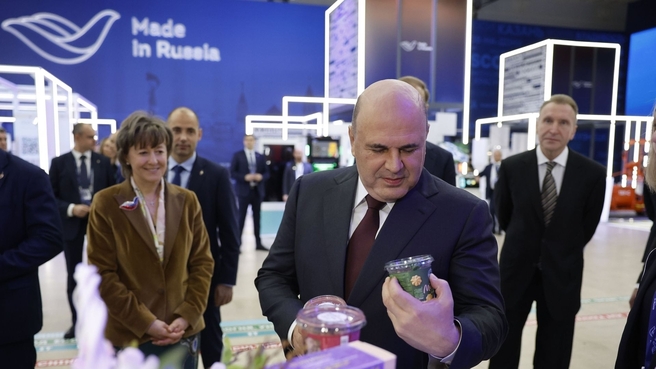
Mikhail Mishustin at the exhibition featuring wares by participants of the Made in Russia 2023 International Export Forum. Left: Veronika Nikishina, Director General of the Russian Export Centre. Belyov Pastila display booth
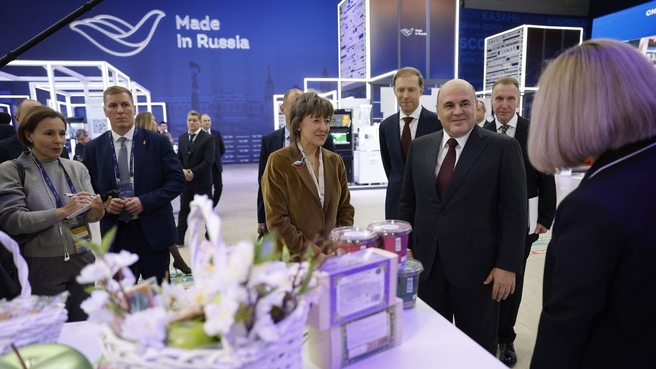
Mikhail Mishustin at the exhibition featuring wares by participants of the Made in Russia 2023 International Export Forum. at the Belyov Pastila display booth. Left: Veronika Nikishina, Director General of the Russian Export Centre. Background: Deputy Prime Minister and Minister of Industry and Trade Denis Manturov and VEB.RF Chairman Igor Shuvalov
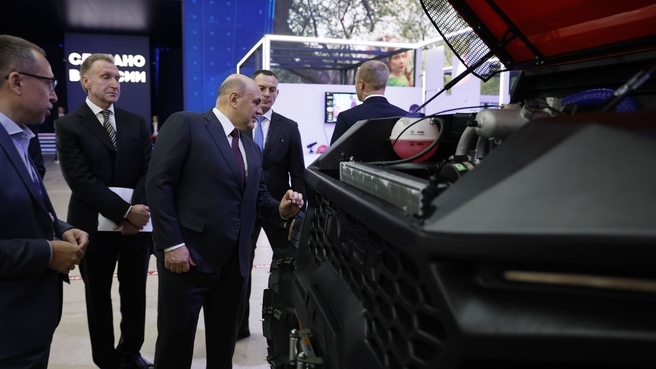
Mikhail Mishustin at the exhibition featuring wares by participants of the Made in Russia 2023 International Export Forum

Mikhail Mishustin at the exhibition featuring wares by participants of the Made in Russia 2023 International Export Forum. at the ADM SYSTEM display booth

Mikhail Mishustin at the exhibition featuring wares by participants of the Made in Russia 2023 International Export Forum. at the VITULUS SME display booth

Mikhail Mishustin at the exhibition featuring wares by participants of the Made in Russia 2023 International Export Forum. at the Termo Glas display booth

Mikhail Mishustin at the exhibition featuring wares by participants of the Made in Russia 2023 International Export Forum. With Veronika Nikishina, Director General of the Russian Export Centre, and Igor Shuvalov, Chairman of VEB.RF

Mikhail Mishustin at the exhibition featuring wares by participants of the Made in Russia 2023 International Export Forum
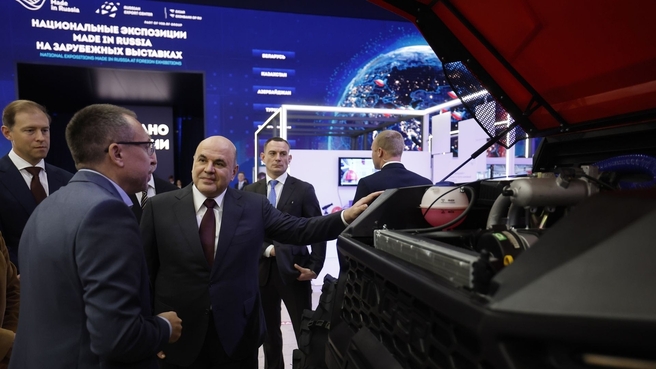
Mikhail Mishustin at the exhibition featuring wares by participants of the Made in Russia 2023 International Export Forum
Mikhail Mishustin at the exhibition featuring wares by participants of the Made in Russia 2023 International Export Forum. With Veronika Nikishina, Director General of the Russian Export Centre. Background: Deputy Prime Minister and Minister of Industry and Trade Denis Manturov and VEB.RF Chairman Igor Shuvalov
The Made in Russia International Export Forum is a key platform for discussing current issues related to Russian exports and working out practical solutions that will help boost the sales of Russian goods and services in foreign markets. The 11th edition of the forum reaffirmed its role in charting new goals for Russia’s foreign trade development. As is traditional, the participants included large, medium and small businesses, Russian banks, regional export support centres, federal and regional executive authorities, interested associations and unions, business media and leading experts.
This year’s forum focuses on the new architecture of Russia’s foreign economic activity. The participants will review the past 18 months’ performance under sanctions, discuss new logistics routes, present solutions for expanding to Asian, African, Latin American and the Middle Eastern markets, and talk about measures of state support for domestic producers.
The forum programme includes more than 30 panel sessions.
The forum will feature its traditional exhibition of Russian-made products, with 186 domestic companies from 46 regions presenting their wares in nine thematic clusters: Industry, Environment, Smart City, IT, Medicine, Construction, Farm equipment, Education, and Consumer Goods.
The forum will also include the awards ceremony for the Exporter of the Year nationwide contest, recognising achievements such as increasing export volumes, entering new markets and upgrading production facilities.
Mikhail Mishustin’s remarks:
Good afternoon, participants and guests.
I am happy to greet you at the Made in Russia International Export Forum. We are meeting on this platform for the fourth time. The forum has proven its worth: it offers a very eventful and relevant agenda and provides the opportunity to discuss the key objectives in the foreign economic activity, exchange knowledge and best practices, talk about increasing exports and promoting our goods abroad, and find solutions that will work in various countries considering their specific features. It is very useful not only for businesses but also for the economy in general.
Despite all the challenges and pressure, Russia continues to develop. The expansion of domestic production brings a significant contribution to this development. The supply side of the economy is developing actively, just as the President instructed. According to the Federal Service for State Statistics, manufacturing industries grew by 6.5 percent in the first eight months of this year.
Exports are a significant element needed to strengthen this dynamic. Our foreign trade is being readjusted. This is not a speedy process, and a certain decline was inevitable, but today we can see a new important trend that has emerged.
I am speaking about the serious boost to cooperation with the friendly states, our partners in the Eurasian Economic Union, the CIS, the SCO, BRICS countries, the Asia-Pacific region, the Middle East, Africa, and Latin America. Despite the external attempts to curb this process, we are improving business ties with these countries, and our mutual trade and cargo volumes keep growing.
According to the preliminary data provided by the Federal Customs Service, in January-July, mutual trade with friendly countries increased almost by 25 percent in terms of value. With China, it increased by almost 33 percent. China is currently our largest foreign economic partner, while Russia ranks sixth in China’s foreign trade. The President spoke about this in his recent interview with Chinese media.
India and the United Arab Emirates are leaders in terms of mutual trade with us, which increased by over 100 percent. Trade with Belarus and Kazakhstan is also showing good results.
Against the backdrop of the illegitimate sanctions and unstable global markets, Russian exporters are finding new footholds. Suppliers of agricultural products and energy equipment for peaceful nuclear development are feeling confident.
Russian business is entering countries with increasing demand where our products are not yet well-known. In this regard, I should note the efforts by our Russian Export Centre, a major development institution involved in foreign economic operations. During this year’s first nine months, non-resource non-energy exports supported by the Centre exceeded 990 billion roubles, showing an 85% increase against last year. The scope of industry support measures has expanded as well, with 16,200 companies having received assistance.
This outcome has resulted from the use of tools to implement the Government’s plans for simplifying the redirection of exports through various financial and non-financial instruments as well as improved dialogue with businesses. We receive ongoing feedback from businesses, which we deem very important as it helps us develop and implement more targeted solutions for providing subsidies and supervising conditions for trade operations, including reimbursement of expenses for rail and sea transportation of raw materials and finished products. This applies to both domestic and foreign markets.
Extensive support is provided under the International Cooperation and Exports national project. The President has already made a decision to extend the relevant programmes following 2024, which will allow businesses to develop long-term strategies and plan investments, including those for production expansion, with the government’s consistent assistance.
To further help domestic companies to assimilate into new markets, we plan to launch a promotional programme focused on the Made in Russia national brand. Today, we looked over the information on this programme featured at the Russian Export Centre booth. The brand will cover Russian-made products approved by the state certification authority as organic, eco-friendly, energy efficient, and reliable. I would like to invite businesses to consider this opportunity.
We are working to develop logistics as well. We have made efforts to significantly reduce transport costs, launched a number of prospective lines and services, and increased traffic along the major export route, the Eastern Operating Domain.
Important practical steps have been taken in creating the International North-South Transport Corridor, one of the railway routes of which will pass to the west of the Caspian Sea. Work has begun to design a section of the Rasht-Astara railway line in Iran. We are also developing logistics in the Azov-Black Sea direction. Just a year and a half ago, it would have been difficult to imagine that projects of this scale could move at such a speed.
All of this increases the reliability of our supplies, reduces exporters’ costs and increases their competitiveness on new markets that are so important to us.
Colleagues,
The topic of today’s plenary session is very important. In today’s conditions, it is necessary to identify additional areas where we can develop our foreign trade and what trends can be used to make the movement as comfortable and efficient as possible for everyone.
It is no secret that there is fierce competition in the world, including for technological leadership and, of course, for control over the global economy from, first of all, Western financial institutions.
The vast majority of countries, Russia included, understand that a more equitable multipolar world economy and truly inclusive development are simply impossible without changing the status quo, without creating new alliances, including with the participation of states of the Global South.
Trade can and should be a tool that sets in motion complex mechanisms of technological exchange, human contacts, intellectual and industrial interaction; a tool for building partnerships with friendly countries based on joint projects and, ultimately, a new world architecture that reflects the objective contribution of all its participants.
Now it is important to form reliable logistics and cooperation ties, including with the countries of the Eurasian Economic Union, BRICS and SCO, and, of course, on a mutually beneficial basis, not only promoting our own economic development, but also helping our trade and strategic counterparties achieve the results they need to promote their economic sovereignty.
This work is underway. For example, a new joint financial mechanism to support industrial cooperation with the EAEU countries is being formed. The heads of state of the EAEU nations agreed to establish it in May. We will subsidise interest rates on loans for cooperative joint projects from the union budget. The key condition is the participation of organisations from three or more member countries of the Eurasian Economic Union.
The union is developing a regulatory framework, and the decisions should be made by the end of the year so that we can provide such subsidies in 2024.
Many states want to do business with us, trade with and invest in Russia. I am confident that together we will learn to do without Western intermediaries and get access to world markets based on our own foreign trade infrastructure or the one created together with our partners.
There has been quite significant progress in this matter. Our companies find opportunities to pay their contract partners despite all restrictions. Together with the Central Bank, we are developing system-wide solutions in this area to make payments more accessible. As for insurance, both marine and credit, Russian services in such areas continue to work. It is possible to make transactions with almost all key buyers and supply products on time.
We are ready to build honest and open relations with those who proceed from their sovereign interests, despite the propaganda of the collective West. And many share our position, as evidenced by the recent expansion of BRICS, as well as the making of long-term plans with our major partners, such as India, China, Turkey, Brazil, and a number of critically important states in the Middle East, Asia, South America, and Africa.
All these are the results of the Government and business’s work in a new format of foreign trade relations, based on trust in Russia as a partner, which we have built over decades.
Colleagues, friends,
Of course, economic cooperation with friendly states should help address internal problems, first of all achieving the national goals set by the President to increase prosperity, promote a favourable demographic situation, ensure technological and financial sovereignty, and increase the unity of our country.
Despite all external challenges, the Government will continue to carry out this work in coordination with the Bank of Russia, taking into account the recommendations of experts, representatives of the business community, and feedback from our citizens. And our economy will further develop step by step.
Today’s forum will involve numerous discussions on the most pressing issues related to expanding foreign trade. I am absolutely sure that many promising ideas will be presented.
And of course, I expect constructive proposals to come out of it. We will definitely study them carefully, and the most significant ones will become the basis for regulatory documents and decisions.
I wish you all fruitful work!
